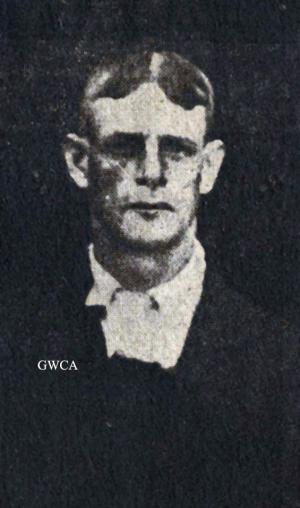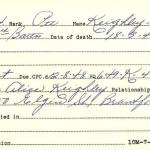BX November 2, 1914
An Interesting Event
A very interesting event took place at Grace Church yesterday when the infant daughter of Mr. and Mrs. William Keighley was baptized. The little lady’s father went with the first contingent three weeks before she was born. Captain Cutcliffe and Mrs. Stephens acted as sponsors. The baby’s name is Ethel Valcartier and very pretty she looked in her white embroidered robe with a silk Union Jack across her breast and a sash of the Duffs’ colors, red and green. A host of friends wish her health and happiness and the safe return of the brave father she has never seen.
BX July 10, 1915
Mouth-Organ Saved Life of Pte. W. Keighley, City – Interesting Story Concerning Two Brantford Men – Little Musical Instrument Saved His Life By Stopping a German Bullet – Wants an Accordion Now to Give Boys Some Music
More concerned over the enforced cessation of his musical indulgences and the destruction of his mouth-organ than over the miraculously narrow escape from death which he experienced, Pte. William Keighley, a member of the Brantford company of the Fourth Battalion, First Contingent for overseas service, has asked for an accordion to take the place of his dilapidated mouth-organ. Brantfordites will recall the report of the remarkable escape from certain death, which was experienced by one of the Dufferin Rifles First Contingent company and which was published in many Canadian papers several weeks ago. Pte. Keighley was carrying a small Swiss mouth-organ, the gift of an English benefit society, with headquarters in London, in his breast pocket, when one of the Huns’ bullets struck the instrument squarely in the centre, but failed to penetrate into the body of the soldier, who escaped without injury.
Thanks to the kindness of Pte. William Jarvis, who was interested in the incident, a copy of the London Daily Express has been received at this office, and under the nome-de-plume of “Orion,” the following article was written:
Our soldiers are amazing fellows. They face death with imperturbability every day of their lives, and when a close call comes they treat it as an everyday occurrence and pass on to the next business. Two instances of their coolness have just come to hand, and it is especially gratifying to learn that two of our readers’ gifts have been the means of saving one soldier’s life and another from being seriously maimed, if not killed.
Before me, as I write, lies a mouth-organ in its case which prevented the loss of one of our brave Canadians, Pte. W. Keighley of the Fourth Battalion, First Brigade Canadian Expeditionary Force. It is a Swiss mouth-organ, but I don’t suppose the man in whose breast pocket it was reposing – when a German bullet found a billet in it – cared much about its nationality. If anyone asked him the question I …. Say he would have been better pleased had it been of German make! There would be something peculiarly appropriate about a German mouth-organ saving the life of a British soldier by stopping a German bullet.”
The following business like letter from the owner of the life-saving mouth-organ describes the incident alluded to:
4th Batt., 1st Brigade
Canadian Expeditionary Force
Dear Orion,
I am returning a mouth-organ which the blessed Huns have put out of action. I had lent it to a chum of mine, Pte. Keighley of the 4th Battalion. He is an expert mouth-organ player, and I believe that when this one got hit he poured out his choicest on the man who sent the bullet.
Anyway, it was a close call for Bill, as he had it in his breast pocket at the time.
Well, old sport, if it would not be too much, we would like an accordion in exchange, as it would help to liven things up a bit for us. If you can’t spare an accordion we should be pleased to receive another mouth-organ. Thanking you for your past favors.
Yours sincerely,
Pte. W. Jarvis (11316)
“What appeals to me especially about the letter is the fact that Pte. Keighley was more concerned about the destruction of his mouth-organ than his close call. He was more annoyed at the enforced cessation of his musical studies caused by a blessed Hun’s bullet than the certain death that would have been his fate but for The Daily Express mouth-organ.”
“Some” Souvenir!
Now that pair of boys wants an accordion in exchange for the bullet furrowed instrument that is now in my possession. (I wonder how much it would fetch as a souvenir of the war, if I put it up to auction for the benefit of the Cheery fund.) Are these boys to have that accordion? We haven’t one in stock, and they are hard to obtain now. I sent off six mouth-organs as a consultation prize on Friday night, but I think ‘Bill’ Keighley Co. deserve the accordion they ask for. Especially as they are Canadians who have come many miles to fight for the motherland. Who will have the honor of supplying this instrument?
Accompanying the above article is a printed photograph of the mouth-organ and its case, showing where the German bullet pierced the box and made a furrow in the instrument itself.
BX March 23, 1918
Are Returning
A party of 438 officers and men arrived in Halifax on Thursday. The veterans, including a few furlough men, are expected to reach Toronto on Monday. The Brantford men include: William W. Bell, Pte. William Keighley, 281 Market Street; Samuel Scott, Harry Shaw, Francis George Westacott and Robert A. Wilson.
BX March 25, 1918
Arrived Home
Some of the veterans expected in the city got in on Sunday and joined their families, who were hardly expecting them home until today. Those who arrived were William W. Bell, William Keighley, Samuel Scott, Francis George Westacott and Harry Shaw. Secretary MacDonald of the Soldiers’ Aid said this morning that there would be arrivals almost every day for some time now, and it was almost impossible to keep track of the men as they come in.
BX May 19, 1948
William Keighley
William Keighley, 150 Elgin Street, well-known and highly respected resident of Brantford and a veteran of the Boer War and the First World War, died in the Brantford General Hospital Thursday night following a lengthy illness. Mr. Keighley, who was in his 68th year, was born in Cheshire, England. He served in the South African War with the 4th Cheshire’s, and in the First World War with the 4th (Mad Fourth) Battalion. He came to Canada and Brantford in 1911 and for 25 years was employed at Ham Brothers and Ruddy-Freeborn Co. plants. He was a member of St. Luke’s Anglican Church and the Canadian Order of Foresters. Surviving are his widow, the former Alice Booth; three daughters, Mrs. Hugh Jenkins, Mrs. Jack Gill, Mrs. W.W. Griggs; one son, Frank W. Keighley, and four grandchildren, all of this city. Mr. Keighley is resting at the Beckett Funeral Home until Sunday afternoon when the service will be held. Interment will be in the family plot at Mount Hope Cemetery.
BX May 22, 1948
William Keighley
A large gathering, including a strong representation from Branch 90, Canadian Legion, attended the funeral Sunday afternoon of William Keighley, late of 150 Elgin Street. Rev. C.V. Tomkins, St. Luke’s Anglican Church, conducted services at the Beckett Funeral Home and at Mount Hope Cemetery. The pallbearers were Stephen Cara and Harry Shaw, representing the South African War veterans, and Peer Whelan, Robert Cross, Silas Taylor and Bert Davis, representing the originals of the Fourth Battalion, E.R. Edwards was in charge of the burial party, and B. Bessant sounded “the Last Post.”


